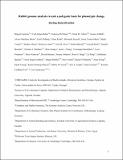Rabbit genome analysis reveals a polygenic basis for phenotypic change during domestication
Author(s)
Lander, Eric Steven
DownloadCarneiro_MS + supplemental material.pdf (5.031Mb)
PUBLISHER_POLICY
Publisher Policy
Article is made available in accordance with the publisher's policy and may be subject to US copyright law. Please refer to the publisher's site for terms of use.
Terms of use
Metadata
Show full item recordAbstract
The genetic changes underlying the initial steps of animal domestication are still poorly understood. We generated a high-quality reference genome for the rabbit and compared it to resequencing data from populations of wild and domestic rabbits. We identified more than 100 selective sweeps specific to domestic rabbits but only a relatively small number of fixed (or nearly fixed) single-nucleotide polymorphisms (SNPs) for derived alleles. SNPs with marked allele frequency differences between wild and domestic rabbits were enriched for conserved noncoding sites. Enrichment analyses suggest that genes affecting brain and neuronal development have often been targeted during domestication. We propose that because of a truly complex genetic background, tame behavior in rabbits and other domestic animals evolved by shifts in allele frequencies at many loci, rather than by critical changes at only a few domestication loci.
Date issued
2014-08Department
Massachusetts Institute of Technology. Department of BiologyJournal
Science
Publisher
American Association for the Advancement of Science (AAAS)
Citation
Carneiro, M., C.-J. Rubin, F. Di Palma, F. W. Albert, J. Alfoldi, A. M. Barrio, G. Pielberg, et al. “Rabbit Genome Analysis Reveals a Polygenic Basis for Phenotypic Change During Domestication.” Science 345, no. 6200 (August 28, 2014): 1074–1079.
Version: Author's final manuscript
ISSN
0036-8075
1095-9203